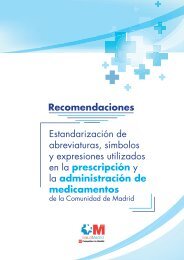lKd7nD
lKd7nD
lKd7nD
You also want an ePaper? Increase the reach of your titles
YUMPU automatically turns print PDFs into web optimized ePapers that Google loves.
Bashō’s masterful haikus. Once the translation is complete, the<br />
students all share, defend, and debate word choices and thought<br />
processes. The program encourages the students to value<br />
exchange and collaboration: in the words of one PIO student,<br />
“Everyone had their own interpretation. They all thought<br />
differently... it made other people think... how could I improve<br />
[my translation]”<br />
In the complex multi-ethnic and multilingual communities<br />
of so many American classrooms, there are also societal benefits<br />
to teaching translation. Teaching poetry in its original language<br />
and guiding kids to bring the poem into English together,<br />
in dialogue, offers an opportunity to value the diversity of<br />
languages and literatures. Students who speak another language<br />
at home see that different languages can all be viewed as equally<br />
valuable, beautiful, powerful, and capable of producing great<br />
art—art so highly valued, in fact, that we want to share it beyond<br />
its home or original language. One student writes, “It’s like...<br />
imagining yourself in a different world.”<br />
Even if there were no assessments of students, no studies of<br />
fiction readers, no proof of the value of the arts for individuals<br />
and communities, we would still publish and teach and have<br />
conversations about literature. Because we believe in human<br />
expression through language, implicitly—we believe in stories<br />
without demonstrable benefits; in poems without quantifiable<br />
value; in reading for the immeasurable pleasure of words<br />
and ideas. We believe in sharing literature from everywhere.<br />
We believe in expanding the contours of our body of reading<br />
simply for the delight of having more books and more variety.<br />
We believe in teaching people how to read—to really read, as a<br />
translator does, absorbing a poem into her marrow and feeling<br />
every single word pulse through her bloodstream. We believe<br />
in teaching people how to write and translate, with mentors like<br />
Garcia Lorca and Dante and Sappho to guide us, offering just<br />
enough firm ground and elevation to allow the wings to unfold<br />
and launch us into the blue, far above the eyelashes of the forest<br />
into worlds layered over even more extraordinary worlds.<br />
Olivia E. Sears is the president and founder of the San Francisco-based<br />
Center for the Art of Translation, which broadens understanding about<br />
international literature and translation. The center has been a frequent<br />
NEA grantee. Sears was the translation editor for the NEA anthology Best<br />
of Contemporary Mexican Fiction and has served on NEA translation<br />
panels.<br />
The Art of Empathy: Celebrating Literature in Translation<br />
45



